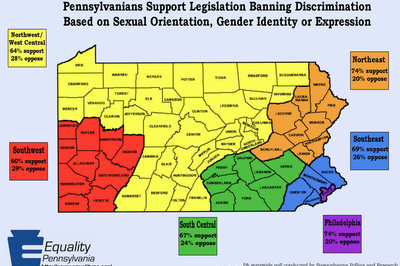A new poll out this week found that a vast majority of Pennsylvania voters support extending the state’s nondiscrimination law to the LGBT community — an effort that has made it back to the state House.
State Rep. Dan Frankel (D-23rd Dist.) submitted a bill Wednesday that would amend the state’s Human Relations Act to include sexual orientation and gender identity as classes protected from discrimination in housing, employment and public accommodations.
The bill has 63 cosponsors, which is down from the nearly 80 the measure had when it was first introduced in the last session, although a number of those lawmakers withdrew their support last session.
The measure has been introduced in the House four times previously but never reached the floor for a vote.
Frankel expects his bill to be assigned to the State Government Committee, chaired by Rep. Daryl Metcalfe (R-12th Dist.), a staunch antigay lawmaker who has spearheaded an effort in the past to ban same-sex marriage and unions in the state constitution.
“To be frank, the outlook is bleak,” Frankel acknowledged, adding he still felt it was important to reintroduce the bill this session. “I’d be very surprised if we get a hearing in committee or a vote, but we still need to show that this is a priority for many of us. I think there’s a sense of frustration when you can’t get things done, but the only way to actually achieve the result you want is through persistence and passion. Even when you’re facing a daunting challenge like this, you have to keep the issue alive.”
Frankel said it may be time for the Senate, which he said is home to some more moderate Republicans than the House, to “step up” on the issue this session.
Sen. Larry Farnese (D-1st Dist.) introduced the nondiscrimination bill in the Senate earlier this month, and Frankel said Sen. Pat Browne (R-16th Dist.) also plans to submit the measure in the Senate, although it is unclear who will lead the Senate fight.
In conjunction with the introduction of Frankel’s bill, Equality Pennsylvania released a poll Wednesday that found that 69 percent of Pennsylvania voters approve of the measure.
According to the survey, which was conducted in February of 1,200 likely voters, the bill had support in each region of the state, with the most in Philadelphia and the northeast segment.
The polling also found support among voters of diverse political ideologies, with 60 percent of conservatives in favor, 75 percent of moderates and 80 percent of liberals. A majority of Republicans, 61 percent, were in favor of the measure, as were those over age 60, at 67 percent — two groups that traditionally are less likely to support LGBT-rights issues.
“The poll results show not only the basic fairness of Pennsylvania, but their consistency as well,” said Equality PA board president Brian Sims, noting the results are on par with polls commissioned by the agency in 2007 and 2003 that found 70 percent and 67 percent support, respectively. “Not only have people not wavered in their view that this type of discrimination is just plain wrong, they have stayed fiercely loyal to that point.”
Despite the wide public support over the past few years, the bill has seen little progress.
“It’s really difficult when you have a focused opposition like we do, particularly when it’s one of the major religious institutions in the commonwealth that has made preventing this a top priority,” Frankel said, referring to the Pennsylvania Catholic Conference, which has strongly opposed the bill for a number of years.
Frankel said the LGBT and ally communities need to be just as engaged in the discussion about LGBT nondiscrimination as the opponents are.
“The community needs to embrace this and make it a priority. The kind of passion and push exerted on the other side of the issue needs to be matched by the LGBT community and by those of us who support the community — families, friends, employers who’ve already incorporated these protections,” he said. “People need to say, how can we defeat the last vestige of legalized discrimination and really be passionate about it? This is about making sure people have civil rights. This shouldn’t be controversial.”
Jen Colletta can be reached at jen@epgn.com.

